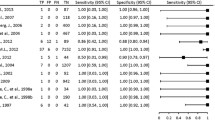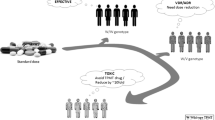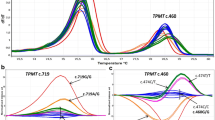Abstract
Objective
More than 11% of the Caucasian population are heterozygous or homozygous carriers of thiopurine S-methyltransferase (TPMT) mutants and are at risk for toxic side effects when treated with thiopurine drugs. Therefore, screening for TPMT polymorphisms in a patient prior to prescribing these agents is recommended. The goal of this study was to determine a cut-off concentration of the TPMT activity assay beyond which genoty** of the TPMT gene should be performed.
Methods
The TPMT activity of 240 unrelated Caucasian subjects was measured using high-performance liquid chromatography. Genoty** for the most frequent allelic variants, TPMT*2, *3A, *3B, *3C and *7 was performed by LightCycler technology and sequencing.
Results
The inter-individual TPMT activity showed a range from 23 nmol MTG/g*Hb*h−1 to 97 nmol MTG/g*Hb*h−1 with a median of 56 nmol MTG/g*Hb*h−1. Using a cut-off concentration of 45.5 nmol MTG/g*Hb*h−1, a test sensitivity of 100% and a specificity of 89% were reached for heterozygous carriers of a TPMT mutation. We identified 1 carrier of TPMT*2, 14 carriers of TPMT*3A and 3 carriers of TPMT*3C, resulting in a TPMT heterozygosity prevalence of 7.5%.
Conclusions
This study defines the cut-off value for the TPMT phenoty** assay at 45.5 nmol/g*Hb*h−1, beyond which additional genoty** elucidates the individual risk for drug therapy. Using this cut-off concentration, the number of genoty** assays could be reduced by about 60%.




Similar content being viewed by others
References
Woodson LC, Weinshilboum RM (1983) Human kidney thiopurine methyltransferase. Purification and biochemical properties. Biochem Pharmacol 32:819–826
Weinshilboum RM, Sladek SL (1980) Mercaptopurine pharmacogenetics: monogenic inheritance of erythrocyte thiopurine methyltransferase activity. Am J Hum Genet 32:651–662
Tai HL, Krynetski EY, Yates CR, Loennechen T, Fessing MY, Krynetskaia NF, Evans WE (1996) Thiopurine S-methyltransferase deficiency: two nucleotide transitions define the most prevalent mutant allele associated with loss of catalytic activity in Caucasians. Am J Hum Genet 58:694–702
Yates CR, Krynetski EY, Loennechen T, Fessing MY, Tai HL, Pui CH, Relling MV, Evans WE (1997) Molecular diagnosis of thiopurine S-methyltransferase deficiency: genetic basis for azathioprine and mercaptopurine intolerance. Ann Intern Med 126:608–614
Szumlanski C, Otterness D, Her C, Lee D, Brandriff B, Kelsell D, Spurr N, Lennard L, Wieben E, Weinshilboum R (1996) Thiopurine methyltransferase pharmacogenetics: human gene cloning and characterization of a common polymorphism. DNA Cell Biol 15:17–30
Otterness D, Szumlanski C, Lennard L, Klemetsdal B, Aarbakke J, Park-Hah JO, Iven H, Schmiegelow K, Branum E, O’Brien J, Weinshilboum R (1997) Human thiopurine methyltransferase pharmacogenetics: gene sequence polymorphisms. Clin Pharmacol Ther 62:60–73
Krynetski EY, Schuetz JD, Galpin AJ, Pui CH, Relling MV, Evans WE (1995) A single point mutation leading to loss of catalytic activity in human thiopurine S-methyltransferase. Proc Natl Acad Sci U S A 92:949–953
Evans WE, Horner M, Chu YQ, Kalwinsky D, Roberts WM (1991) Altered mercaptopurine metabolism, toxic effects, and dosage requirement in a thiopurine methyltransferase-deficient child with acute lymphocytic leukemia. J Pediatr 119:985–989
Lennard L, Lilleyman JS, Van Loon J, Weinshilboum RM (1990) Genetic variation in response to 6-mercaptopurine for childhood acute lymphoblastic leukaemia. Lancet 336:225–229
Lennard L (1998) Clinical implications of thiopurine methyltransferase—optimization of drug dosage and potential drug interactions. Ther Drug Monit 20:527–531
Colombel JF, Ferrari N, Debuysere H, Marteau P, Gendre JP, Bonaz B, Soule JC, Modigliani R, Touze Y, Catala P, Libersa C, Broly F (2000) Genotypic analysis of thiopurine S-methyltransferase in patients with Crohn’s disease and severe myelosuppression during azathioprine therapy. Gastroenterology 118:1025–1030
Gearry RB, Barclay ML, Burt MJ, Collett JA, Chapman BA, Roberts RL, Kennedy MA (2003) Thiopurine S-methyltransferase (TPMT) genotype does not predict adverse drug reactions to thiopurine drugs in patients with inflammatory bowel disease. Aliment Pharmacol Ther 18:395–400
Schwab M, Schaffeler E, Marx C, Fischer C, Lang T, Behrens C, Gregor M, Eichelbaum M, Zanger UM, Kaskas BA (2002) Azathioprine therapy and adverse drug reactions in patients with inflammatory bowel disease: impact of thiopurine S-methyltransferase polymorphism. Pharmacogenetics 12:429–436
Krynetski EY, Fessing MY, Yates CR, Sun D, Schuetz JD, Evans WE (1997) Promoter and intronic sequences of the human thiopurine S-methyltransferase (TPMT) gene isolated from a human PAC1 genomic library. Pharm Res 14:1672–1678
Spire-Vayron de la Moureyre C, Debuysere H, Fazio F, Sergent E, Bernard C, Sabbagh N, Marez D, Lo Guidice JM, D’Halluin J C, Broly F (1999) Characterization of a variable number tandem repeat region in the thiopurine S-methyltransferase gene promoter. Pharmacogenetics 9:189–198
Spire-Vayron de la Moureyre C, Debuysere H, Sabbagh N, Marez D, Vinner E, Chevalier ED, Lo Guidice JM, Broly F (1998) Detection of known and new mutations in the thiopurine S-methyltransferase gene by single-strand conformation polymorphism analysis. Hum Mutat 12:177–185
Schaeffeler E, Lang T, Zanger UM, Eichelbaum M, Schwab M (2001) High-throughput genoty** of thiopurine S-methyltransferase by denaturing HPLC. Clin Chem 47:548–555
Schutz E, von Ahsen N, Oellerich M (2000) Genoty** of eight thiopurine methyltransferase mutations: three-color multiplexing, “two-color/shared” anchor, and fluorescence-quenching hybridization probe assays based on thermodynamic nearest-neighbor probe design. Clin Chem 46:1728–1737
Weinshilboum RM, Raymond FA, Pazmino PA (1978) Human erythrocyte thiopurine methyltransferase: radiochemical microassay and biochemical properties. Clin Chim Acta 85:323–333
Ganiere-Monteil C, Pineau A, Kergueris MF, Azoulay C, Bourin M (1999) Thiopurine methyl transferase activity: new extraction conditions for high-performance liquid chromatographic assay. J Chromatogr B Biomed Sci Appl 727:235–239
Jacqz-Aigrain E, Bessa E, Medard Y, Mircheva Y, Vilmer E (1994) Thiopurine methyltransferase activity in a French population: HPLC assay conditions and effects of drugs and inhibitors. Br J Clin Pharmacol 38:1–8
Kroplin T, Weyer N, Gutsche S, Iven H (1998) Thiopurine S-methyltransferase activity in human erythrocytes: a new HPLC method using 6-thioguanine as substrate. Eur J Clin Pharmacol 54:265–271
Weinshilboum R (1987) Pharmacogenetics of methyl conjugation and thiopurine drug toxicity. Bioessays 7:78–82
Coulthard SA, Hogarth LA, Little M, Matheson EC, Redfern CP, Minto L, Hall AG (2002) The effect of thiopurine methyltransferase expression on sensitivity to thiopurine drugs. Mol Pharmacol 62:102–109
Spire-Vayron de la Moureyre C, Debuysere H, Mastain B, Vinner E, Marez D, Lo Guidice JM, Chevalier D, Brique S, Motte K, Colombel JF, Turck D, Noel C, Flipo RM, Pol A, Lhermitte M, Lafitte JJ, Libersa C, Broly F (1998) Genotypic and phenotypic analysis of the polymorphic thiopurine S-methyltransferase gene (TPMT) in a European population. Br J Pharmacol 125:879–887
McLeod HL, Siva C (2002) The thiopurine S-methyltransferase gene locus—implications for clinical pharmacogenomics. Pharmacogenomics 3:89–98
Evans WE, Hon YY, Bomgaars L, Coutre S, Holdsworth M, Janco R, Kalwinsky D, Keller F, Khatib Z, Margolin J, Murray J, Quinn J, Ravindranath Y, Ritchey K, Roberts W, Rogers ZR, Schiff D, Steuber C, Tucci F, Kornegay N, Krynetski EY, Relling MV (2001) Preponderance of thiopurine S-methyltransferase deficiency and heterozygosity among patients intolerant to mercaptopurine or azathioprine. J Clin Oncol 19:2293–2301
McLeod HL, Krynetski EY, Wilimas JA, Evans WE (1995) Higher activity of polymorphic thiopurine S-methyltransferase in erythrocytes from neonates compared to adults. Pharmacogenetics 5:281–286
Lysaa RA, Giverhaug T, Wold HL, Aarbakke J (1996) Inhibition of human thiopurine methyltransferase by furosemide, bendroflumethiazide and trichlormethiazide. Eur J Clin Pharmacol 49:393–396
Acknowledgement
We are grateful for the generous donation of genomic DNA with TPMT*2, *3B, *3C and *7 alleles by Dr. med. N. von Ahsen, Uniklinikum Göttingen, Department of Clinical Chemistry, Göttingen, Germany.
Author information
Authors and Affiliations
Corresponding author
Rights and permissions
About this article
Cite this article
Wusk, B., Kullak-Ublick, G.A., Rammert, C. et al. Thiopurine S-methyltransferase polymorphisms: efficient screening method for patients considering taking thiopurine drugs. Eur J Clin Pharmacol 60, 5–10 (2004). https://doi.org/10.1007/s00228-004-0728-1
Received:
Accepted:
Published:
Issue Date:
DOI: https://doi.org/10.1007/s00228-004-0728-1




